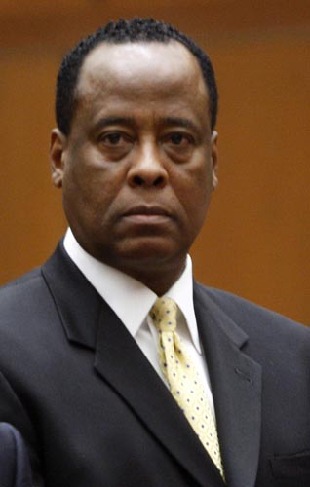
Dr. Conrad Murray is shown during a hearing in Los Angeles in this April 5, 2010 file photograph. [Xinhua/Reuters File Photo]
|
|
|
Dr. Conrad Murray is shown during a hearing in Los Angeles in this April 5, 2010 file photograph. [Xinhua/Reuters File Photo] |
The highly-publicized trial against late pop icon Michael Jackson's personal physician Conrad Murray opened Tuesday in Los Angeles, with prosecutors and defense attorneys fought with each other and came up with a large number of testimonies and evidences.
A seven-men and five-women jury which was sworn in last Friday heard the case while a prosecutor, in his opening statement, accused Murray for acting with negligence and incompetence while caring for Jackson, 50, by ignoring all standards of medical care while giving the singer heavy doses of a powerful sedative that killed him.
Deputy District Attorney David Walgren told the panel that evidence would show Murray, a cardiologist who was hired by Jackson for 150,000 U.S. dollars a month to care for him, "repeatedly acted with gross negligence, repeatedly denied care, appropriate care to his patient,Michael Jackson, and that it was Dr. Murray's repeated incompetence and unskilled acts that led to Mr. Jackson's death on June 25, 2009."
To illustrate his case, Walgren showed a picture of what appears to be Michael Jackson's lifeless body on a gurney.
Jackson, 50, was pronounced dead at 2:26 p.m. on June 25, 2009 at the Ronald Reagan UCLA Medical Center. The coroner's office determined that Jackson died of acute Propofol intoxication and classified his death as a homicide.
Murray, 58, who is free on 75,000-dollar bail, faces up to four years in prison if convicted of the involuntary manslaughter charge.
According to Walgren, at around 5 a.m. on the day when Jackson died, the King of Pop told Murray that he needed to sleep and they agreed Propofol was the answer. Murray said he gave the singer 25 milligrams of the potent drug, but that would only put him to sleep for minutes.
Much more Propofol was administered, prosecution alleged.
Murray sent e-mails and made eight phone calls after administering the drug on Jackson for about 45 minutes. The last call was made at 11:51 to a girlfriend when Murray realized there was an emergency.
When paramedics arrived at the scene, the singer was dead. However, Murray never told the EMTs he had gave the pop singer Propofol, although they asked if Jackon had had any drugs.
At the insistence by Murray, Jackson's body was transferred to UCLA, where Murray once again failed to mention the drug.
Walgren told jurors that between April 6 and June 10, 2009, Murray ordered 255 vials of Propofol, totaling 4.09 gallons of the "general anesthetic agent."
Murray and his teams of defense attorneys contended that Jackson swallowed Lorazepam pills and gave himself a lethal dose of Propofol while Murray was out of the pop icon's bedroom.
Defense attorney Edward Chernoff contended that Murray agreed to administer a small amount of Propofol, then monitored Jackson's pulse and breathing before leaving the singer's bedroom.
After he left, however, a frustrated Jackson woke up and swallowed Lorazepam pills, then somehow gave himself the fatal dose of Propofol, Chernoff claimed.
"The evidence will show you ... that when Dr. Murray left the room, Michael Jackson self-administered a dose of Propofol that, with the Lorazepam, created a perfect storm in his body that killed him instantly," Chernoff said. "When Dr. Murray came into the room and found Michael Jackson, there was no CPR, there was no doctor, no paramedic, no machine that was going to revive Michael Jackson.
"He died so rapidly, so instantly, he didn't even have time to close his eyes."
The attorney insisted that Murray was weaning Jackson off Propofol, a drug the singer told the doctor he had been taking for years -- calling it his "milk" that he could not sleep without. He had been unable to sleep for 10 hours before Murray administered Propofol on him.
As the prosecution's first witness, Kenny Ortega -- the creator and co-director of the ill-fated "This Is It" concert series -- testified that Jackson was "completely" involved in the process of preparing for the London concerts.
According to him, Jackson, although "very excited "about the London show, missed several rehearsals in late June, shortly before his death. He noticed that the singer wasn't right on June 19, six days before his death, as the singer seemed lost and was "incoherent."
Ortega, who previously worked with Jackson on his "Dangerous" and "HIStory" tours, was so worried about Jackson that he sent an email to AEG Live CEO Randy Phillips, saying Michael needed psychological help.
Ortega was confronted by Murray during a meeting between Jackson, his doctor, Phillips and Jackson's manager at the singer's rented home the following day. Murray told him he was upset Ortega didn't let him rehearse, berating him for acting like a doctor.
The prosecution's second witness, Paul Gongaware, co-CEO of AEG Live Concerts, testified that AEG Live Concerts West initially contracted with Jackson for 31 concerts that sold out as quickly as tickets were offered.
There were still 200,000 people in the queue for tickets -- enough to sell out another 50 shows -- when tickets to the 50 shows were sold out, Gongaware said.
The trial is expected to last four to five weeks.